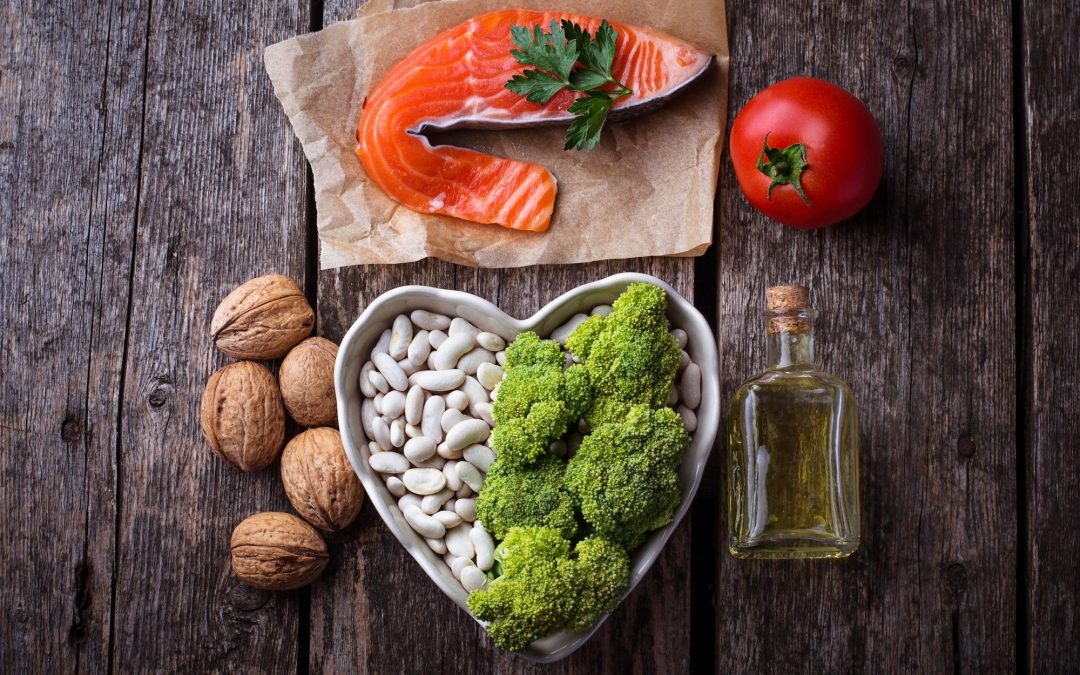Your diet and heart health are interconnected. Follow these guiding principles for a heart-healthy diet.
Your diet has a big effect on your heart health. A heart-healthy diet can help maintain a healthy weight, lower cholesterol, maintain healthy blood pressure and blood sugar levels, and improve your mood.
Follow these guiding principles to create your own heart-healthy lifestyle.
Reduce Portion Size
How much you eat is just as important as what you eat. Portion sizes have increased significantly over the past few decades. We eat giant portions compared to many other parts of the world. A good rule of thumb is to use an 8-9 inch plate and fill half of it with veggies. Fill the other half with protein and carbs. That should help you control your portion sizes!
There are all kinds of visual representations online for what your portion sizes should be. Find one that works for you and your diet! Read this article on tips for portion control.
Eat More Fruits and Vegetables
Everyone knows that fruits and vegetables are good sources of vitamins, minerals, and fiber. A diet rich in vegetables and fruits can lower blood pressure, reduce the risk of cardiovascular diseases, and help blood sugar levels. Eating more fruits and vegetables will help you cut down on higher calorie foods like meat, cheese, and snack foods.
If you’re not already convinced of the health benefits of fruits and vegetables, read this article!
Vary your Protein Intake
Choose heart healthy proteins like chicken breasts, legumes, soy, low-fat dairy products, eggs, fatty fish, and lean ground meats. Stay away from fatty, processed, breaded, and fried meats. Be creative with your protein intake. Swap out falafel or black bean burgers for beef. Give tofu a try. Swap out chicken with fish in your favorite recipes.
Read these tips to vary your protein sources.
Limit Sodium
Too much sodium increases blood pressure. If you already have high blood pressure, and you eat too much sodium, your blood pressure will increase to even higher levels. Cutting down on sodium can reduce your risk of chronic high blood pressure. Canned foods, microwave meals, and other processed foods are very high in sodium.
Read this article to find out about the effects of sodium on your heart health.
Meal Prep
Prepping your meals is a fool-proof way to make sure that you’re eating healthy, nutritious meals. When you’re not prepared, it’s much easier to order a pizza or grab takeout on the way home. If you know that you have home cooked meals in your fridge waiting to be eaten, you’re much less likely to get sucked into fast food. Meal prepping can be time consuming, but it’s worth it. You get all your cooking done in one day and don’t have to think about it for the rest of the week.
Check out this beginner’s guide to meal prepping.
Indulge Occasionally
Completely cutting out all sweets and treats will lead to binges. Give in to your cravings occasionally, but don’t completely forgo your healthy eating. If you’re in the mood for something salty, grad a handful of potato chips, or a few salted nuts, but don’t go crazy. If you’re craving something sweet, eat a small candy bar or a piece of your favorite fruit. Treat an indulgence like something special. If you start doing it every day, it will no longer be an indulgence.
Check out this interesting perspective on indulgence.
Diet vs. Lifestyle Change
Think of your new healthy eating plan as a lifestyle, not a diet. Diets are a temporary plan to lose weight, but lifestyles are long-term health solutions. Diet mentality urges you to just hold on, just restrict for a little bit longer until you can go back to “normal.” Lifestyle changes are long-term and sustainable.
Read this article to read about the difference between diets and lifestyle changes.
Your diet affects your heart health tremendously. Take care of your heart by giving it the nourishment that it needs.

